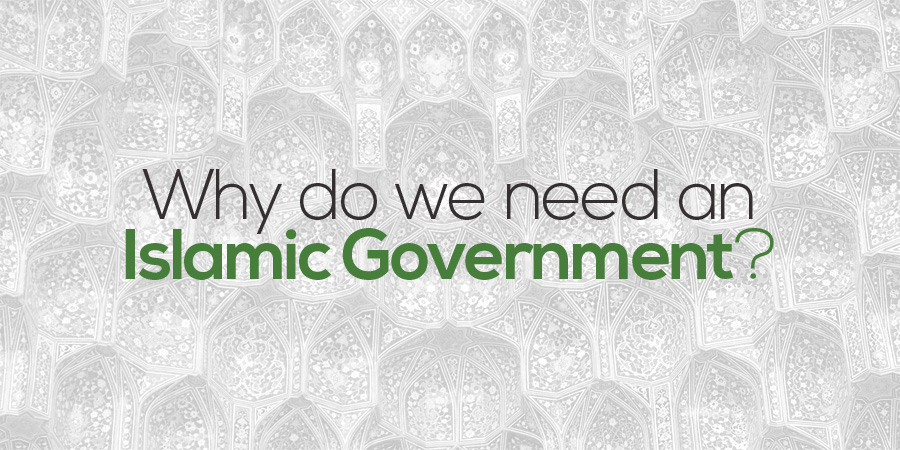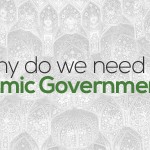Why Do We Need an Islamic Government? (5)

Reason, the laws of Islam, and the practice of the Prophet (s), and that of the Commander of the Faithful (‘a), the purport of various Qur’anic verses and Prophetic traditions—all indicate the necessity of forming a government. As an example of the traditions of the Imāms, I now quote the following tradition of Imām Ridā1 (‘a):
“If someone asks, ‘Why has God, the All-Wise, appointed the holders of authority and commanded us to obey them?’ then we answer, ‘For numerous reasons. One reason is this: Men are commanded to observe certain limits and not to transgress them in order to avoid the corruption that would result. This cannot be attained or established without there being appointed over them a trustee who will ensure that they remain within the limits of the licit and prevent them from casting themselves into the danger of transgression. Were it not for such a trustee, no one would abandon his own pleasure and benefit because of the corruption it might entail for another.”
“ Another reason is that we find no group or nation of men that ever existed without a ruler and leader, since it is required by both religion and worldly interest. It would not be compatible with divine wisdom to leave mankind to its own devices, for He, the All-Wise, knows that men need a ruler for their survival. It is through the leadership he provides that men make war against their enemies, divide among themselves the spoils of war, and preserve their communal solidarity, preventing the oppression of the oppressed by the oppressor.”
“A further reason is this: were God not to appoint over men a solicitous, trustworthy, protecting, reliable leader, the community would decline, religion would depart, and the norms and ordinances that have been revealed would undergo change. Innovators would increase and deniers would erode religion, inducing doubt in the Muslims. For we see that men are needy and defective, judging by their differences of opinion and inclination and their diversity of state. Were a trustee, then, not appointed to preserve what has been revealed through the Prophet (s), corruption would ensue in the manner we have described. Revealed laws, norms, ordinances, and faith would be altogether changed, and therein would lie the corruption of all mankind.”2
Now I paraphrase hadīth for you. Imām Ridā says if someone should ask you, “Why has God, the All-Wise, appointed holders of authority and commanded you to obey them?” you should answer him as follows: “He has done so for various causes and reasons. One is that men have been set upon a certain well- defined path, and commanded not to stray from it, nor to transgress against the established limits and norms, for if they were to stray, they would fall prey to corruption.
Now men would not be able to keep to their ordained path and to enact God’s laws unless a trustworthy and protective individual (or power) were appointed over them with responsibility for this matter, to prevent them from stepping outside the sphere of the licit and transgressing against the rights of others.
If no such restraining individual or power were appointed, nobody would voluntarily abandon any pleasure or interest of his own that might result in harm or corruption to others; everybody would engage in oppressing and harming others for the sake of his own pleasures and interests.
“Another reason and cause is this: we do not see a single group, nation, or religious community that has ever been able to exist without an individual entrusted with the maintenance of its laws and institutions—in short, a head or a leader; for such a person is essential for fulfilling the affairs of religion and the world.
It is not permissible, therefore, according to divine wisdom that God should leave men, His creatures, without a leader and guide, for He knows well that they depend on the existence of such a person for their own survival and perpetuation. It is under his leadership that they fight against their enemies, divide the public income among themselves, perform Friday and other congregational prayers and foreshorten the arms of the transgressors who would encroach on the rights of the oppressed.
“Another proof and cause is this: were God not to appoint an Imām over men to maintain law and order, to serve the people faithfully as a vigilant trustee, religion would fall victim to obsolescence and decay. Its rites and institutions would vanish; the customs and ordinances of Islam would be transformed or even deformed. Heretical innovators would add things to religion and atheists and unbelievers would subtract things from it, presenting it to the Muslims in an inaccurate manner. For we see that men are prey to defects; they are not perfect, and must need to strive for perfection.
Moreover, they disagree with each other, having varying inclinations and discordant states. If God, therefore, had not appointed over men one who would maintain order and law and protect the revelation brought by the Prophet (s), in the manner we have described, men would have fallen prey to corruption; the institutions, laws, customs, and ordinances of Islam would be transformed; and faith and its content would be completely changed, resulting in the corruption of all humanity.”
As you can deduce from the words of the Imām (‘a), there are numerous proofs and causes that necessitate formation of a government, and establishment of an authority. These proofs, causes, and arguments are not temporary in their validity or limited to a particular time, and the necessity for the formation of a government, therefore, is perpetual.
For example, it will always happen that men overstep the limits laid down by Islam and transgress against the rights of others for the sake of their personal pleasure and benefit. It cannot be asserted that such was the case only in the time of the Commander of the Faithful (‘a), and that afterwards, men became angels. The wisdom of the Creator has decreed that men should live in accordance with justice and act within the limits set by divine law. This wisdom is eternal and immutable, and constitutes one of the norms of God Almighty.
Today and always, therefore, the existence of a holder of authority, a ruler who acts as trustee and maintains the institutions and laws of Islam, is a necessity—a ruler who prevents cruelty, oppression, and violation of the rights of others; who is a trustworthy and vigilant guardian of God’s creatures; who guides men to the teachings, doctrines, laws, and institutions of Islam; and who prevents the undesirable changes that atheists and the enemies of religion wish to introduce in the laws and institutions of Islam. Did not the caliphate of the Commander of the Faithful (‘a) serve this purpose? The same factors of necessity that led him to become the Imām still exist; the only difference is that no single individual has been designated for the task.3The principle of the necessity of government has been made a general one, so that it will always remain in effect.
If the ordinances of Islam are to remain in effect, then, if encroachment by oppressive ruling classes on the rights of the weak is to be prevented, if ruling minorities are not to be permitted to plunder and corrupt the people for the sake of pleasure and material interest, if the Islamic order is to be preserved and all individuals are to pursue the just path of Islam without any deviation, if innovations and the approval of anti-Islamic laws by sham parliaments4 are to be prevented, if the influence of foreign powers in the Islamic lands is to be destroyed—government is necessary.
None of these aims can be achieved without government and the organs of the state. It is a righteous government, of course, that is needed; one presided over by a ruler who will be a trustworthy and righteous trustee. Those who presently govern us [in most of Islamic countries] are of no use at all for they are tyrannical, corrupt, and highly incompetent.
In the past, we did not act in concert and unanimity in order to establish proper government and overthrow treacherous and corrupt rulers. Some people were apathetic and reluctant even to discuss the theory of Islamic government, and some went so far as to praise oppressive rulers. It is for this reason that we find ourselves in the present state. The influence and sovereignty of Islam in society have declined; the nation of Islam has fallen victim to division and weakness; the laws of Islam have remained in abeyance and been subjected to change and modification; and the imperialists have propagated foreign laws and alien culture among the Muslims through their agents for the sake of their evil purposes, causing people to be infatuated with the West. It was our lack of a leader, a guardian, and our lack of institutions of leadership that made all this possible. We need righteous and proper organs of government; that much is self-evident.
Source: Islamic Government, Imām Khomeini
References:
- Imām Ridā: eighth of the Twelve Imāms, born in 148/765 and died in 203/817 in Tūs (Mashhad). He was poisoned by the Abbasid caliph Ma’mūn, who had appointed him as his successor at first, but then grew fearful of the wide following he commanded (see p. 137). His shrine in Mashhad is one of the principal centers of pilgrimage and religious learning in Iran. See Bāqir Sharīf al-Qarashi, The Life of Imām ‘Ali bin Mūsā al-Ridā, trans. Jāsim al-Rasheed (Qum: Ansariyan Publications); Muhammad Jawād Fadlallāh, Imam al-Ridā: A Historical and Biographical Research, trans. Yāsīn T. al-Jibouri, http://www.al-islam.org/al-rida/index.html; Muhammad Mahdi Shams ad-Dīn, “Al-Imām ar-Ridā (‘a) and the Heir Apparency,” At-Tawhīd Journal, http://www.al-islam.org/al-tawhid/heir.htm. (Pub.)
- The text of this tradition can be found in Shaykh Sadūq, ‘Ilal ash-Sharāi‘ (Qum, 1378/1958), I, sec. 182, hadīth 9, p. 251. (Pub.)
- That is, in the absence of the Imām or an individual deputy named by him (as was the case during the Lesser Occultation), the task devolves upon the fuqahā as a class. See argument on pp. 44-112.
- Here the allusion may be in particular to the so-called Family Protection Law of 1967, which Imām Khomeini denounced as contrary to Islam in an important ruling. See Imām Khomeini, Tauzih al-Masā’il, n.p., n.d., pp. 462-463, par. 2836, and p. 441.


